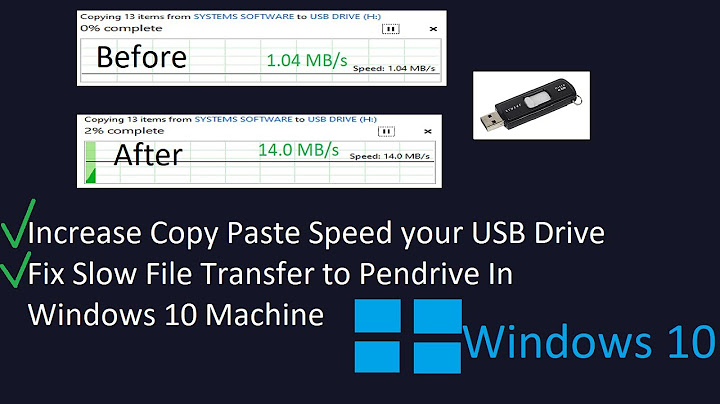Why does my flash drive speed slow down when copying?
Solution 1
This behaviour is not specific to your flash drive, you can see this with hard drives as well. It has to do with the caching mechanism most operating systems and disks employ to speed up small writes.
The 20mb/s you see is the data being written to the disk cache (usually quick but small memory). Once this cache is full it must be flushed to disk - and now you're being bottlenecked by the slower disk.
Example 1: The effect is really pronounced when you have a controller with a large cache (like good RAID5 controller) where ~500mb of data can be cached quickly before it must be flushed to the disk.
Example 2: You can see the cache at play if you pull the flash drive out at the same time the file copy "finished". At this point in time your file is split between the disk and the cache - so the copy is "finished" as far as the operating system is concerned but the disk controller still needs to write what's left in the cache to the disk. If you put the flash drive back in and inspect the file you'll see it's not all there.
Disclaimer: These examples won't work if you don't have write caching enabled in your operating system/on the disk.
Further, if it's not disk caching at work then it's likely that what you're seeing is an effect of fragmentation. As the disk gets fuller and fuller less contiguous free space is available and the file system has to work harder to find places to put your files.
Solution 2
While caching does cause some of this, it is not the only factor. If caching were the only factor, then we would expect the write speed to quickly drop from several hundred MB/s to the drive's actual write speed very rapidly, and stay there for the rest of the write. However, this is not what I have observed when performing large transfers to and from the disk (e.g. burning boot images). Instead, what I observe is that the speed gradually decreases over the course of the entire operation.
This slowdown is caused by data remanence on the flash chip(s) used to store the data necessitating that some of the blocks be written to more than once.
Inside a flash chip, there are block of data that can be written to. When writing, there are only two things that the computer can do: it can erase an entire block, or change some (or all) of the bits in a block from 0 to 1.
However, some of those block are better than others, especially so in lower-quality flash drives, and as a result when writing new data to it, some of the bits can sometimes switch back to 0 by themselves right after being written, and don't change. Thus, when writing to a block, the OS needs to check to make sure that all of the data was written correctly, and if it wasn't it has to redo the block by writing the same data to the same block two or three times until the data sticks.
So, when your computer is writing a bunch of data to the flash drive, here is a (not completely accurate, but good enough) explanation for how it does that:
- Take the first set of blocks to be written, and write them all.
- Read back all of the blocks we just wrote, and make a list of the ones that don't match
- Write the next set of blocks, along with the ones that weren't written correctly last time.
- Repeat 2-3 until all of the blocks have been written correctly.
When the computer is writing to the drive, it is reporting the rate at which it is writing blocks to the drive for the first time. Since it will also have to rewrite earlier blocks at the same time, the total throughput that can be used for virgin blocks goes down as the number of rewrites that also need to happen increases. Thus, the apparent write speed decreases over time.
Related videos on Youtube
LanceBaynes
Updated on September 18, 2022Comments
-
LanceBaynes almost 2 years
After a few minutes of copying, it just gets slower and slower. Why?
e.g. It starts with 20 MByte/sec, and when it finishes with it, it's @10 MByte/s.
Various files, big, small, etc.
UPDATE: question is regarding various operating systems, so it's a "general question"
-
hicklypups almost 13 yearsHow much are you copying versus how much free memory do you have in your computer?
-
LanceBaynes almost 13 yearsPC -> USB-FLASH drive: several hundred GBytes free -> few GBytes free
-
hicklypups almost 13 yearsI suspect that you have files cached in memory at first so they transfer quickly, and then once they start being moved from the hard drive, it slows down. I can't be sure in your case though.
-
LanceBaynes almost 13 yearsso you're advising me to use the "sync" command more often?
-
hicklypups almost 13 yearsI don't understand what you mean by the sync command. You gave no context to the question. I am not even sure what OS.
-
LanceBaynes almost 13 years
-
-
surfasb almost 13 yearsAlso keep in mind it is a flash drive. It's hardware was never optimized for speed, but rather affordability.
-
ta.speot.is almost 13 yearsI don't think that would explain why the performance would decrease during long file copies. Rather performance would decrease over the life of the drive, yes?
-
surfasb almost 13 yearsIt makes perfect sense. They are optimized for burst speeds, not sustained operations. Think of the average size of files being loaded onto flash drives. Would you optimize for a 30 second long file transfer or optimize for a 2 second long transfer? Add that onto of your two examples, and it explains plenty.
-
surfasb almost 13 yearsIt's like when you try to cram two people through an average door at a time. At first, you can calculate. Wow, I went from zero people through that door to two at a time. My speed is great. Then the line gets longer and your sampling gets better and you finally realize that small sample = bad math. . .
-
sepehr over 10 years@ta.speot.is I suppose this disk cache you mentioned is handled by OS on hard disk and is different from the hardware cache which hard drives have internally,right?
-
Blaizz about 8 yearsThe difference in write speeds of different storage devices can be extreme, for example compare the write speed of an old SD card to the write speed of a SATA III SSD.
-
 Ben N about 8 yearsPlease refrain from personal insults. While your post may be correct, you must edit it to comply with our community standards.
Ben N about 8 yearsPlease refrain from personal insults. While your post may be correct, you must edit it to comply with our community standards. -
 Eric about 6 yearsI'm writing a 12 Gig 7zip file to a brand new USB 3.0 flash drive formatted as NTFS. It was going about 100 MB/s for the first minute then dropped to 25ish MB/s for about a minute, then dropped to 11 or so for about 10 minutes. It wasn't a gradual downward slope, it was 3 distinct plateaus.
Eric about 6 yearsI'm writing a 12 Gig 7zip file to a brand new USB 3.0 flash drive formatted as NTFS. It was going about 100 MB/s for the first minute then dropped to 25ish MB/s for about a minute, then dropped to 11 or so for about 10 minutes. It wasn't a gradual downward slope, it was 3 distinct plateaus. -
 Eric about 6 yearsI was copying the archive off my old i7 laptop with 16 Gigs of RAM. Copying this same 7zip archive off of the same thumbdrive on my new Xeon laptop with 32 Gigs of RAM took 2 minutes and there was no drop off in speed.
Eric about 6 yearsI was copying the archive off my old i7 laptop with 16 Gigs of RAM. Copying this same 7zip archive off of the same thumbdrive on my new Xeon laptop with 32 Gigs of RAM took 2 minutes and there was no drop off in speed. -
 J Slick almost 6 yearsDo flash drives even have cache?
J Slick almost 6 yearsDo flash drives even have cache?




